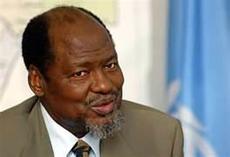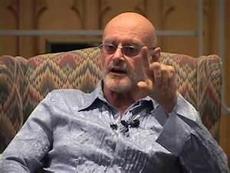|
TRANSLATE THIS ARTICLE
Integral World: Exploring Theories of Everything
An independent forum for a critical discussion of the integral philosophy of Ken Wilber
 Steve Taylor is a lecturer in psychology at Leeds Metropolitan University, UK. He is the author of Back to Sanity: Healing the Madness of the Human Mind. Eckhart Tolle has called his work 'an important contribution to the shift in consciousness happening on our planet at this time.' stevenmtaylor.co.uk. Can Meditation
Change the World?
The Amazing Story of
the Meditating President
Steve Taylor
In the long term, meditation increases our capacity for empathy, compassion and rationality
Last week a group of my students were giving a presentation on the spiritual philosopher Ken Wilber. It included a video interview in which Wilber remarked, ‘The best way to stop famine in the world is to meditate.’
Some students were outraged, and my initial thought was that the comment was glib and offensive. Surely the best way to stop famine is to provide food, to donate money, or at least to end conflict or reduce corruption?
However, there is a case study which illustrates Wilber’s meaning very clearly. It’s the story of the ‘meditating president’, Joachim Chissano of Mozambique.
 Joachim Chissano
Joachim Chissano
In 1992, Mozambique’s civil war came to an end, after 15 years of devastation, and around a million casualties. The country was completely broken, and showing all signs of being trapped in the cycle of conflict and corruption which has afflicted many African countries. But Joachim Chissano - whose forces had won the war - surprised the world by acting sensibly and empathically. Rather than trying to shore up his own power base and enacting revenge, Chissano treated the rebel forces who had been trying to overthrow his government with respect. He made compromises, promised there would be no prosecutions or punishments and offered the rebels half of the places in the Mozambiquan army. He gave them the chance of gaining power through political means. Rather than trying to crush the rebels, he began to work with them.
Two years later, Mozambique's first ever multi-party elections were held, and Chissano and the former rebel leader came face to face in the polls. Chissano won the election, and set about the task of establishing lasting peace by reducing poverty. Between 1997 and 2003, almost three million people were rescued from extreme poverty, out of a total population of almost 20 million. This lead to a 35% decrease in the number of children dying under the age of five, and an increase of 65% in the number of children going to primary school. Through Chissano’s ability to set aside differences and connect with his former enemies, Mozambique was brought back from the brink of self-destruction and has instead become one of Africa’s most stable and peaceful countries.
What was it that made Chissano so rational and compassionate as a leader?
In 1992, he learned transcendental meditation. Quickly becoming aware of the benefits of the practice himself, he taught it to his family, then his cabinet ministers and his wider government. In 1994,it became a requirement for all military and police recruits to meditate twice a day, for 20 minutes.
Chissano himself is in no doubt that this collective meditation was responsible for the peace and increasing prosperity of the country. As he said, ‘The result has been political peace and balance in nature in my country...The culture of war has to be replaced by the culture of peace. For that purpose, something deeper has to be changed in our mind and in our consciousness to prevent the recurrence of war.’
In 2004, Chissano’s second term in office came to end. Rather than pursuing a third term – as he would have been legally able to do under Mozambique law – he stepped aside. Since then he has been an elder statesman, campaigning for peace and working as an envoy and negotiator for the United Nations. In 2007, on his 68th birthday, he was awarded Africa’s equivalent of the Nobel Prize, the $5 million prize for Achievement in African Leadership.
 Ken Wilber
Ken Wilber
This is Wilber’s point, of course. In the short term, meditation reduces anger and aggression. In the long term, it increases our capacity for empathy, compassion and rationality. It leads to less self-centred behaviour, and reduces cravings for power and wealth. It generates a sense of well-being which makes us less liable to be affected by slights or prejudices.
Research has confirmed these effects. In 2003, scientists at the University of Winsconsin scanned the brain of people with a long experience of Buddhist meditation. They found that their left pre-frontal lobes – the areas of the brain linked with positive moods and emotions – were unusually active. In other words, they seemed to be happier than normal. In a 2011 study at the University of Masschusetts Center for Mindfulness 16 people meditated for an average of 27 minutes each day. MRI scans after 8 weeks showed increased ‘grey matter’ in parts of the brain associated with compassion, introspection and learning.
So Wilber seemingly glib comments may well be right. Human social behaviour is a manifestation of our inner state. Discord in the world stems from discord in our minds, and there will only be harmony and peace in the world once there is harmony and peace inside us.
|
 Steve Taylor is a lecturer in psychology at Leeds Metropolitan University, UK. He is the author of Back to Sanity: Healing the Madness of the Human Mind. Eckhart Tolle has called his work 'an important contribution to the shift in consciousness happening on our planet at this time.' stevenmtaylor.co.uk.
Steve Taylor is a lecturer in psychology at Leeds Metropolitan University, UK. He is the author of Back to Sanity: Healing the Madness of the Human Mind. Eckhart Tolle has called his work 'an important contribution to the shift in consciousness happening on our planet at this time.' stevenmtaylor.co.uk.
